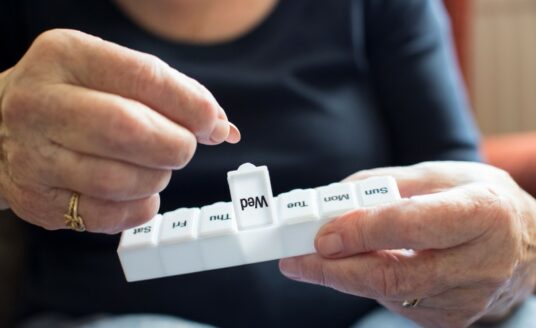The words “dignity” and “grace” can seem far removed from the reality of dementia. Symptoms of the disease may include fear, frustration, anxiety, depression, anger and aggression. But there are methods caregivers and adult children can use to restore calm, self-control and confidence in a senior loved one suffering from dementia.
Just as it is important to monitor the senior’s medical condition, however, it is also important to evaluate how happy, comfortable and engaged the senior is. Studies have shown that people with dementia who are able to maintain feelings of dignity and respect are less likely to become depressed and anxious.
Finding Dignity and Grace
Let them do what they are able to do. Whatever tasks a senior with dementia can complete safely, let them do it, whether it’s folding laundry, gardening, or choosing what is appropriate to wear. Praise them, and let them enjoy their accomplishments. This helps maintain self-worth.
Actively listen. What a senior suffering from dementia says may make little sense to a caregiver or family member, but it does mean something to the senior. Language problems can also vary from day to day, at different times of the day, and can be made worse if the person is tired, in pain or not feeling well. Eliminate distractions, like a TV or radio program. In addition, large gatherings of people talking in a room can be overwhelming for someone with dementia.
Often, people with dementia struggle to find the right words or any word at all. They may use words in the wrong order or use substitutes for words. (Example: “The thing to write with,” instead of the word “pen.”) People in more advanced stages may express themselves with body language, gestures or facial expressions.
The Alzheimer’s Society provides more tips for communication with a person who has dementia:
Speak directly to the person. Don’t ask someone else in the room about the senior when the senior is present. Example: A visitor asks a caregiver how Mom is without addressing the question to Mom, who is also in the room.
Don’t talk loudly if it is not necessary. Not all seniors with dementia have hearing loss.
Don’t use baby talk. A high-pitched tone people use when talking to an infant, especially when it is accompanied by getting ”in the face” of the senior, is not appropriate behavior.
Avoid slang and figures of speech. If a person suffering from dementia is told “there’s no use crying over spilled milk,” he or she may look for spilled milk instead of being comforted.
Position yourself at their level. Don’t stand over the senior, looking down on them. Bend down to be on their level.
Smile and make eye contact. Smiles can encourage relaxation and decrease stress, because they are a non-challenging facial expression. Be aware of any non-verbal cues you use that can communicate your impatience or frustration. Keep your body language relaxed.
Treat them as the person they are. Seniors suffering from dementia still have a personality, with habits, likes and dislikes. Take advantage of that when you are together. Play music the senior has always enjoyed. Review a photo album together. When he or she feels like talking, discuss past family events. Take the senior on short outings—eat at his or her favorite restaurant, go shopping, visit a favorite location.
Allow time for the senior to respond. The ability of people with dementia to comprehend what is being said and form a response is slowed by the disease. Don’t rush to the next topic or repeat the question until you have given them extra time to respond.
Limit the number and complexity of your questions. Don’t interrogate your loved one, or ask questions that include multiple options. Example: “Dad, do you want water, tea, soda, orange juice, or coffee?” Simple questions that can be answered yes or no are best. If you do offer a question with options, keep it simple as well: “Mom, would you like to shower before or after dinner?”
Use the name the senior prefers. Saying “honey” or “sweetheart” may sound endearing but could come off as patronizing.
Avoid criticism, corrections or arguments. The senior may forget something repeatedly even over the space of a few minutes. It is useless and can be harmful to their pride to say, “I already told you that five times.” From the senior’s perspective, they are asking for the information for the first time. Take a break if you as a caregiver or family member find your patience waning.
Help with personal hygiene. If a person is clean, groomed and appropriately dressed, they will feel better about who they are. It’s not always possible for a person with dementia to handle these tasks. If the senior is embarrassed about bathing assistance, a caregiver might drape their loved one with a towel during bathing.
Incontinence may be an issue in the later stages of dementia. Always deal with this promptly and without blaming the senior.
Manage negative behaviors. If the senior lashes out or gets frustrated while trying to accomplish a task, remain calm and try to redirect them to another activity or subject to discuss. Avoid shaming the senior. Rather, try to discover the root cause of the behavior out of respect for the senior.
Make their space feel like a home. Depending upon the senior’s condition, there may be a large number of medications and assistive devices that are necessary. Try to minimize the visual presence of these items, and decorate living spaces with the objects the senior treasures.
Use humor. A senior’s sense of humor may change as dementia progresses. What he or she finds amusing may be less verbal humor and more slapstick. It may even be inappropriate at times — laughing at someone who has just been injured. But humor has been shown to have positive effects for people with dementia.
For more information aging well and dementia, visit Bethesda’s Health & Wellness blog.
| Bethesda has a 133-year tradition of providing excellent senior living options, including independent living, assisted living, memory care, and skilled nursing. If you are considering memory care, we welcome you to tour one of our exceptional communities, including Bethesda Dilworth, Bethesda Meadow, Bethesda Southgate, and Bethesda Hawthorne Place. Discover the level of care that only a non-profit staffed by highly-trained nurses, therapists, and aids can offer. |
Want to find out more?
If you’d like to stay up to date with Bethesda Health Group, sign up here to receive our blog and newsletters!
"*" indicates required fields
Related Articles
Want to find out more?
If you’d like to stay up to date with Bethesda Health Group, sign up here to receive our blog and newsletters!
"*" indicates required fields



